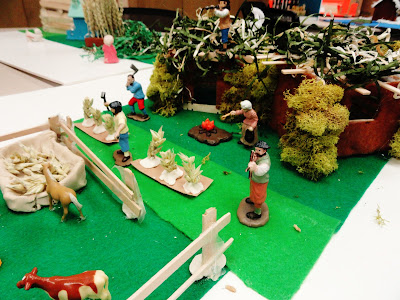South Carolina plantation
Check out the white plantation house - such a creative use of resources!
Barn/slave quarters
Here's a small wheat farm in Pennsylvania
Here's a model of early Virginia
Super cool tobacco plants
Nice work!
And... finally... our winners. Congratulations, Massachusetts!
Your colony illustrated so many things that were characteristic of a New England colony. First, you illustrated life along the coast with the sea. Check out the ships and the fisherman - the fishing industry was a huge part of New England's economy, as well as a major food source for the early colonists.
You included the shipbuilding industry as well. Here are some hard-working men building ships - another important part of New England's economy.
Agriculture played a smaller role in New England than it did in the middle or southern colonies. They had very small farms. Here a colonist prepares to eat some salt pork on his small farm - a common food eaten during the long winter months.
Here's a great representation of the logging industry that was so important to early colonial New England.
I love how this colony incorporated the cold Northern climate by using snow. Here, the women perform domestic tasks, just as we discussed in class.
Everyone did a wonderful job and I had a blast watching everyone use their creative talents!




























